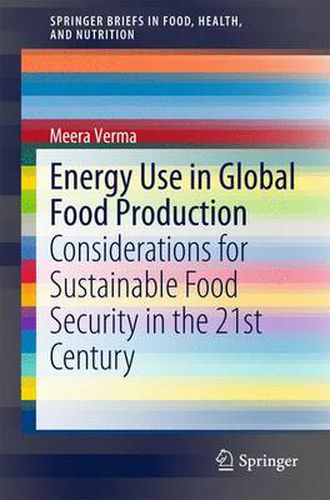Readings Newsletter
Become a Readings Member to make your shopping experience even easier.
Sign in or sign up for free!
You’re not far away from qualifying for FREE standard shipping within Australia
You’ve qualified for FREE standard shipping within Australia
The cart is loading…






This title is printed to order. This book may have been self-published. If so, we cannot guarantee the quality of the content. In the main most books will have gone through the editing process however some may not. We therefore suggest that you be aware of this before ordering this book. If in doubt check either the author or publisher’s details as we are unable to accept any returns unless they are faulty. Please contact us if you have any questions.
This Brief examines the sustainability of energy use in global food production and processing. The nexus between food, water, and energy are explored against a background of climate change. Current efforts to reduce the energy intensity of food and increase sustainability are explored. Food waste and its impact on energy is covered, including regional variations and nutrient recycling methods. Energy Use in Global Food Production uses case studies to illustrate how food production and processing is a significant contributor to anthropogenic climate change.
Modern industrial agriculture uses fossil fuel to grow crops and produce fertilizers, pesticides and farm machinery. Additional energy is used to transport and process food at a primary and secondary level. With the median forecast for global population at more than 9 billion by 2030, a 30% increase over the current population, energy efficient food processing will be of increasing importance. This Brief provides an overview of current energy efficient food processing methods looks at the way forward as demands continue to increase.
$9.00 standard shipping within Australia
FREE standard shipping within Australia for orders over $100.00
Express & International shipping calculated at checkout
This title is printed to order. This book may have been self-published. If so, we cannot guarantee the quality of the content. In the main most books will have gone through the editing process however some may not. We therefore suggest that you be aware of this before ordering this book. If in doubt check either the author or publisher’s details as we are unable to accept any returns unless they are faulty. Please contact us if you have any questions.
This Brief examines the sustainability of energy use in global food production and processing. The nexus between food, water, and energy are explored against a background of climate change. Current efforts to reduce the energy intensity of food and increase sustainability are explored. Food waste and its impact on energy is covered, including regional variations and nutrient recycling methods. Energy Use in Global Food Production uses case studies to illustrate how food production and processing is a significant contributor to anthropogenic climate change.
Modern industrial agriculture uses fossil fuel to grow crops and produce fertilizers, pesticides and farm machinery. Additional energy is used to transport and process food at a primary and secondary level. With the median forecast for global population at more than 9 billion by 2030, a 30% increase over the current population, energy efficient food processing will be of increasing importance. This Brief provides an overview of current energy efficient food processing methods looks at the way forward as demands continue to increase.